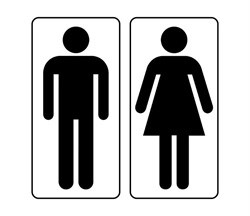A recent exposé published in a South African daily newspaper and featured on the front page as "School Toilets of Shame", revealed the horrific truth about sanitation in Gauteng schools - in most cases there isn't any. Images of broken toilets and taps, filthy basins, fouled walls, blocked drains, flooded floors and bloodied dustbins bare a level of degradation that is unspeakable. Yet South Africa's children are expected to utilise these facilities and, in some cases, attempt to clean them themselves as punishment.
The article confirms the health risks to learners, including exposure to life-threatening diseases, such as trachoma, which causes blindness, urinary tract infections and diarrhoea. Children are most susceptible to contracting infectious diseases such as these as a result of poor sanitation. Globally, every two minutes, a child dies of diarrhoea diseases due to poor sanitation, hygiene issues and unsafe drinking water. After leaving the dirty bathrooms, learners also risk further infection and spread of germs as there are no adequate facilities to wash their hands with soap. This leads to absenteeism, weak performance, girls dropping out of school and an exceedingly negative effect on these learners' education.
A collaborative approach
Clean toilets are about much more than avoiding a bad experience; they are about dignity, respect and academic success. This challenge is way above the capabilities and resources of a single organisation. If corporates, non-governmental agencies, government and schools all work together, surely a brighter future is possible for these learners. A collaborative approach should be embraced through private public partnerships (PPPs) to tackle this growing challenge.
In the discussion on the state of the toilets in our schools, it has been argued that it is the schools' responsibility to clean the toilets. However, a representative of the Congress of South African Students commented that provincial education departments should be allocating more funds specifically for the hiring of cleaners at schools. Due to budgetary constraints, many schools are simply not able to employ full-time cleaners.
In a follow up EWN News report, rights group Section 27 commented that both schools and government have the responsibility to ensure that adequate infrastructure is in place. Yet the lack of adequate resources is preventing this from happening. And it's the future of our children that's being put at risk.
However, what becomes clearer every day is that we all have a role to play. Businesses can contribute a great deal through innovation and product development, raising awareness on sanitation matters, behaviour change methodology and capacity building.
Unilever Sustainable Living Plan
In November 2010, Unilever launched the Unilever Sustainable Living Plan (USLP), our blueprint for sustainable growth. As part of this commitment we will be helping one billion people improve their health and well-being by 2020. In 2014 a new target was announced specifically on sanitation which set out to help 25 million people gain improved access to a toilet in this same timeframe. Our company was founded on the principle to make sustainable living common place, and the Sowetan article shows that this is as much needed today as it ever was.
Unilever works through our trusted brands, such as Domestos and Lifebuoy to improve sanitation as well as influence behaviour change in hand washing. Furthermore, the brands have been an informative resource for learners as these programmes have provided useful content on sanitation, hygiene and handwashing.
Domestos has been the main sponsor of World Toilet Day (WTD) since 2009, striving to do its part to remedy the current global sanitation crisis. Statistics were released that there are over 24,000 public schools in South Africa, yet less than 8,000 of these have flushing toilets. As a result, Unilever has become involved at school level to assist in improving the quality of sanitation offered nationwide.
Through Domestos, Unilever has an ongoing involvement in the renovation of toilets at schools, educating learners regarding good sanitation, good hygiene habits and employing janitors to keep the areas germ-free. By the end of 2014, 22 schools had their toilets repaired and renovated through the 'Cleaner Toilets, Brighter Future' campaign and over 21,000 learners had benefitted from this intervention.
Sustainable interventions
The second part of the campaign will be to engage with the Department of Basic Education to develop a plan of action to address these dire needs. Unilever continues to seek ways to scale up on this programme in order to have a wider reach. This includes engaging the right NGO and government partners, working hand in hand with our communities.
We are proud of our contribution, but this challenge requires collaborative hands on deck and sustainable interventions. The issue needs support for renewed infrastructure, ongoing funding and a dedication to educating schools on the importance of proper sanitation so that improved facilities can be maintained.
Government needs to set policy and regulations to ensure progress on universal access to sanitation in schools, and provide a framework for action. We must all then work together, bringing the right skills, resources and capacity to achieve progress.
Great potential for social impact is created when corporations, organisations and government work together to bring positive change. Much more can be achieved together than will ever be possible in isolation. It is time for us to embrace the future of South Africa's children; to protect them, educate them and provide them with the facilities they need to have a brighter future.


















































